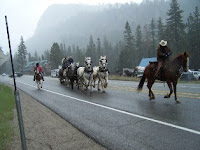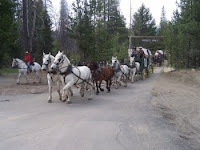Okay, here’s a pet peeve of mine….those who don’t know when the twelve days of Christmas are. These days I’m seeing all sorts of references to the Twelve Days of Christmas. Between now and Christmas: get free books, recipes, or enter a contest. The only problem is that NOW is not the Twelve Days of Christmas. They are not the twelve days BEFORE Christmas. They are the twelve days AFTER Christmas. This mixed up reference, is to me, as maddening as those who object to Christmas decorations before Halloween. We are putting one celebration before another.
Part of this confusion comes from people who are not part of a liturgical church tradition. This is not a bad thing, it’s just a misunderstanding of when and what the Twelve Days are all about. The churches that follow a liturgical year (Advent, Christmas, Epiphany, Lent, Easter, Pentecost) have set the time-line for the celebration of the Twelve Days of Christmas….the Christmas season, which is from December 25th through January 5th, the day before the Epiphany or the traditional day of celebration for the visit of the Three Kings to the baby Jesus.
In some cultures, Christmas is celebrated as a holy day, without the exchange of gifts. Gifts are instead exchanged on Epiphany or, in some cases, a gift a day is exchanged during the Twelve Days of Christmas. Epiphany, January 6th, as said, is the observation of the day the Magi arrived to pay homage to the Christ child. They brought their gifts for the new-born king. In the liturgical year, it is the beginning of the Epiphany season, the time before Lent starts with its forty days of self-deprivation.
No doubt, you’ve heard of Mardi Gras and the big parties held around the world in observance of it. A traditional time of celebration and revelry. One goodie often found at this time is a king cake, a reference to the three kings. This time of celebration is held during Epiphany Season, and ends on the Tuesday before Ash Wednesday.
Ah, but I digress, though I did want to show how the year follows one thing after another. It helps to explain when the correct Twelve Days of Christmas are. The Liturgical Year starts with the First Sunday of Advent, four Sundays before Christmas Day. For 2010, that ‘new year’s day’ was November 28th. From then until Christmas Day, the liturgical church is in the season of Advent. The season of Christmas starts with Christmas Day and goes for twelve days. January 5th is often referred to as Twelfth Night. In some traditions, it marks the removal of Christmas decorations and feasting.
I’m also sure you’ve heard of the song The Twelve Days of Christmas. The origin of this song is in dispute, but the meaning behind it doesn’t seem to be. The items given to the ‘singer’ of the song are not as simple as they appear. The do, in fact, refer to God’s grace.
Ace Collins in “Stories Behind the Best-Loved Songs of Christmas” explains the meanings behind the gifts:
The “true love” giving the gifts represented the pure love of God. Each gift represented a major doctrine of the Catholic faith.
A Partridge in a Pear Tree
The partridge represents the courage and devotion of Christ dying for his people. A mother partridge will lure predators away from her chicks, even sacrificing her life for them. The pear tree symbolizes the wooden cross upon which Jesus died.
Two Turtle Doves
This represents the Old and New Testaments of the Bible. Doves also symbolize truth and peace.
Three French Hens
French hens were the food of kings in sixteenth century England. Here they represent the expensive gifts brought by the wise men to the newborn Jesus.
Four Calling Birds
These symbolize the authors of the four Gospels.
Five Gold Rings
These are the five Old Testament books known as the Law of Moses.
Six Geese A-Laying
Here we have the six days in which God created the world. The eggs, from which new life springs, symbolize creation.
Seven Swans a-Swimming
These represent the seven gifts of the Holy Spirit outlined by the apostle Paul: prophesy, service, teaching, encouraging, giving, leadership and mercy. The swan, a graceful bird, symbolized these virtues.
Eight Maids A-Milking
Being a milk maid was one of the lowest jobs in sixteenth century England. Jesus came to save the poor and the humble, thus this gift represents Jesus’ love for the common people.
Nine Ladies Dancing
This dance represents the nine fruits of the spirit: love joy, peace, patience, kindness, goodness, faithfulness, gentleness and self-control.
Ten Lords A-Leaping
Here is a reminder of the Ten Commandments.
Eleven Pipers Piping
These represent the eleven faithful apostles who followed Jesus to the end and spread his message after his death. While there were twelve apostles, one betrayed Jesus.
Twelve Drummers Drumming
This is a symbol for the twelve tenets of the Catholic faith laid out in the prayer, “The Apostles’ Creed”. The drummers may provide the cadence for reciting this prayer.
Thinking you might want to give these gifts? Remember first off that the items repeat themselves. So that on the second day, it’s a gift of two turtle doves AND a partridge in a pear tree. On the third day it’s three French hens, two turtle doves and another partridge in a pear tree. So that at the end of the 12 days, you’d have given 364 gifts, which in 2010 would cost $96,824, an increase of 10.8% over last year, according to the annual Christmas price index compiled by PNC Wealth Management. And remember, you start giving them on Christmas Day...not December 13 or 14th.
Read more at
Suite101: The Twelve Days of Christmas: Legend of the Christmas Carol’s Twelve Gifts
Arriving home for Christmas, the last thing Jacob Scott expects in his house is a sexy, shotgun-toting stranger. Worse, his attraction to her bothers him even more than the gun. Still reeling from the deception of his long-time girlfriend, he’s not looking for romance.
Tessa Jones has learned one hard lesson—when everyone in your life has failed you the only one you can trust is yourself. Facing the whispers of the townsfolk and an arson charge, Tessa unexpectedly finds herself trusting Jacob with more than her legal troubles.
Struggling between the promise of the present and the hurts of the past, can these two lost souls overcome their pain long enough to discover a gift beyond all measure?
Available now at
The Wild Rose Press.
Anna Kathryn Lanier
http://www.aklanier.com/


















